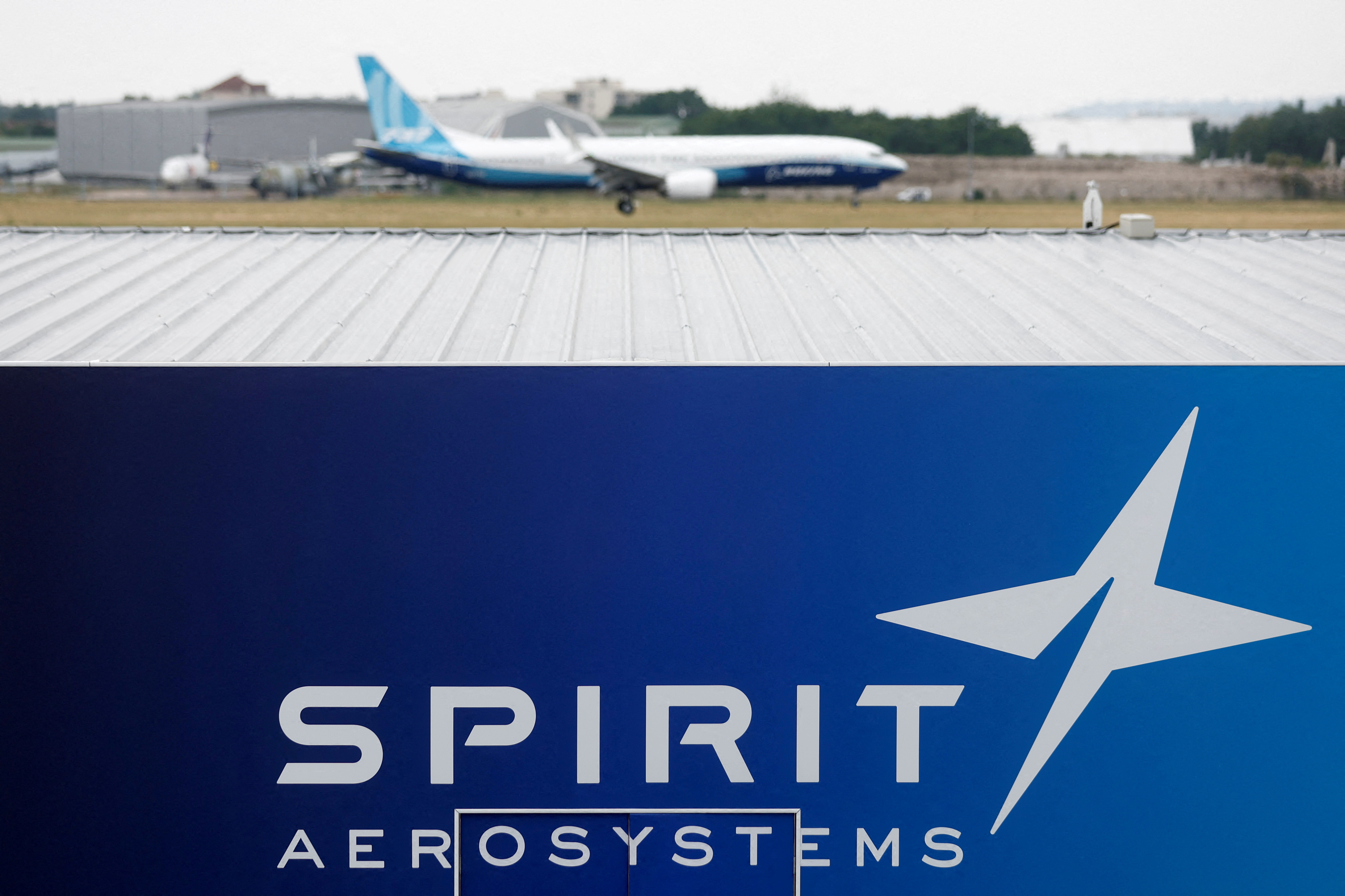
A Boeing 737 MAX-10 lands over the Spirit AeroSystems logo during a flying display at the 54th International Paris Air Show at Le Bourget Airport near Paris, France, June 22, 2023. REUTERS/Benoit Tessier/File Photo
Aug 2 (Reuters) – Shares of Spirit AeroSystems (SPR.N) plummeted 30% in midday trading on Wednesday after the aerospace manufacturer disclosed $105 million in losses on Boeing (BA.N) and Airbus (AIR.PA) aircraft production and forecast a bleak cash flow picture for the rest of the year.
The outlook stunned analysts, who grilled executives about how the company planned to arrest its soaring cash burn rate. Spirit warned that growing labor costs, continued supply chain disruptions, and its rising debt burden were adding to financial difficulties as it struggles to meet the glut of orders from aircraft giants Boeing and Airbus.
“There is a sense of urgency by the management team here,” Chief Financial Officer Chief Financial Officer Mark Suchinski said.
Analysts focused specifically on whether the mounting financial difficulties would cause Spirit to try to re-negotiate contracts with Boeing and Airbus – its biggest customers- to account for inflation and other rising costs.
Spirit now projects that annual free cash burn – or the company’s expected cash consumption – will be in the $200 million to $250 million range, compared with the $100 million to $150 million annual cash burn expected in the first quarter.
The company said a two-week work stoppage by employees represented by the International Association of Machinists and Aerospace Workers (IAM) in Wichita, Kansas – as well as the ensuing labor agreement — piled even more financial pressure, adding $80 million in annual labor costs and contributing to losses on Boeing programs.
“The orders are coming in, production rates are going up, but all suppliers are facing challenges with these higher level of costs,” CEO Tom Gentile said, responding to questions on contract renegotiation.
He added that rising material and labor costs were an “important systemic issue” that Airbus and Boeing “do need to address,” but did not specifically say whether the company had engaged the planemakers.
Spirit also said it absorbed $28.3 million in costs related to the new labor deal, as well as $7.3 million in strike disruption charges in the second-quarter.
While Suchinski said free cash flow is expected to turn positive in the 2024-2025 timeframe, Gentile added that the company will have to look at refinancing options to pay down debt due in April 2025.
“Spirit’s finances remain in a parlous state,” wrote Vertical Research Partners analyst Robert Stallard in a note. “Being in virtual indentured servitude to Boeing is not a good place to be, and we struggle to see a pathway to consistent free cashflow generation.”
‘DISTRESSED SUPPLIERS’ AND PROGRAM LOSSES
Spirit reported a quarterly adjusted loss per share of $1.39, bigger than analyst expectations of an 87 cents per share loss, per Refinitiv data.
While revenue rose 8% to $1.37 billion, cash burn was $211 million for the three months through June, the company said, compared to $79 million a year earlier.
The Boeing 787 Dreamliner, the Airbus A350 and the Airbus A220 programs each took a multimillion dollar hit due to labor, supply chain costs and production recovery rate efforts.
Due to the pause in production during the strike, Spirit will deliver 370 to 390 narrowbody 737 fuselages to Boeing in 2023, down from the 390 to 420 fuselages expected last quarter.
While Spirit is ramping 737 fuselage production to 42 per month in August, “we won’t be able to fully recover the lost manufacturing days from the work stoppage,” in part because days off will keep Spirit delivering at a pace of about 35 fuselages per month in the back half, Gentile said.
Over the past 18 months, Spirit has had to absorb $200 million in costs due to supply chain challenges, Gentile said.
“We still see examples of distressed suppliers, even smaller ones, which have significantly disrupted our operations because of shortages we’ve had to address,” he said.
Spirit executives said the company is taking on more inventory in the back half of the year as a hedge against supply chain issues to accommodate the 737 ramp up, with at least one additional rate increase expected in 2024.
In one bright spot for the company, Spirit announced it has completed all work needed to fix incorrectly installed fittings on 737 aircraft at its factory, resolving a major problem discovered this spring at the $31 million cost it initially expected.
However, it said it recorded a $23 million loss in revenue “to account for a potential claim from Boeing for repair work to date at their facility,” adding that this estimate represents “the low end of the range of potential liability.” Suchinski said the charge represents about half of the affected 737s in Boeing’s inventory.
Reporting by Abhijith Ganapavaram and Valerie Insinna; Editing by Will Dunham, Mark Porter, Kirsten Donovan and Aurora Ellis
Our Standards: The Thomson Reuters Trust Principles.
Credit: Source link
